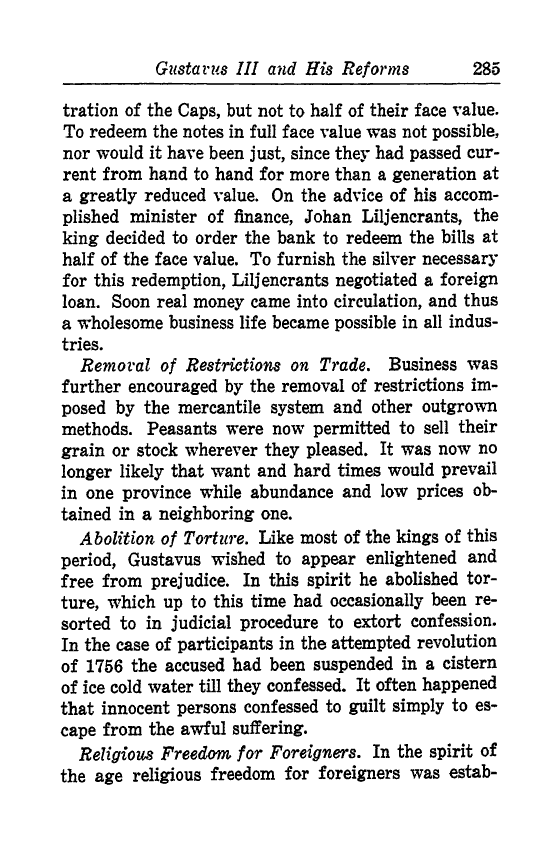
Full resolution (TIFF) - On this page / på denna sida - XVI. Reign of Gustavus III, 1771–1792 - C. Reforms of Gustavus III

<< prev. page << föreg. sida << >> nästa sida >> next page >>
Below is the raw OCR text
from the above scanned image.
Do you see an error? Proofread the page now!
Här nedan syns maskintolkade texten från faksimilbilden ovan.
Ser du något fel? Korrekturläs sidan nu!
This page has never been proofread. / Denna sida har aldrig korrekturlästs.
Gustavus HI and His Reforms 285
tration of the Caps, but not to half of their face value.
To redeem the notes in full face value was not possible,
nor would it have been just, since they had passed cur-
rent from hand to hand for more than a generation at
a greatly reduced value. On the advice of his accom-
plished minister of finance, Johan Liljencrants, the
king decided to order the bank to redeem the bills at
half of the face value. To furnish the silver necessary
for this redemption, Liljencrants negotiated a foreign
loan. Soon real money came into circulation, and thus
a wholesome business life became possible in all indus-
tries.
Removal of Restrictions on Trade. Business was
further encouraged by the removal of restrictions im-
posed by the mercantile system and other outgrown
methods. Peasants were now permitted to sell their
grain or stock wherever they pleased. It was now no
longer likely that want and hard times would prevail
in one province while abundance and low prices ob-
tained in a neighboring one.
Abolition of Torture. Like most of the kings of this
period, Gustavus wished to appear enlightened and
free from prejudice. In this spirit he abolished tor-
ture, which up to this time had occasionally been re-
sorted to in judicial procedure to extort confession.
In the case of participants in the attempted revolution
of 1756 the accused had been suspended in a cistern
of ice cold water till they confessed. It often happened
that innocent persons confessed to guilt simply to es-
cape from the awful suffering.
Religious Freedom for Foreigners. In the spirit of
the age religious freedom for foreigners was estab-
<< prev. page << föreg. sida << >> nästa sida >> next page >>